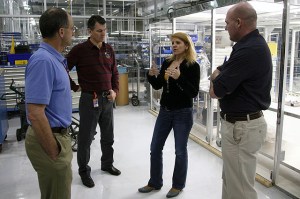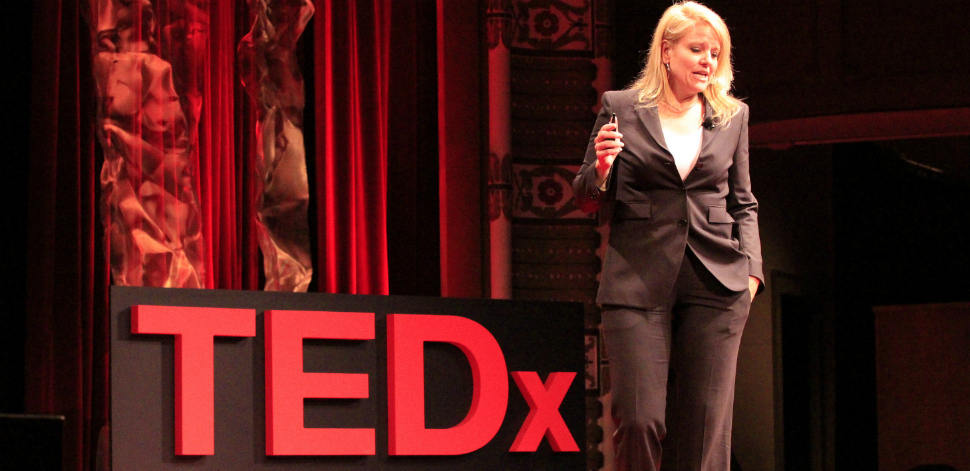Scott Smith, March 31, 2017
If SpaceX?s Gwynne Shotwell has her way, Dragons will land on the surface of Mars in the next decade.
Dragon spaceships, that is.
Shotwell is a Northwestern graduate as well as the president and chief operating officer of SpaceX, one of the leading private companies who innovate within the field of aerospace technology and provide space transport services.
After leaving Northwestern with a bachelor?s degree in mechanical engineering, Shotwell worked briefly at Chrysler Motors before returning to school to earn a master?s degree and embark on a career in the aerospace industry. She joined SpaceX in 2002 and became its president in 2008.
SpaceX?s current missions involve its Falcon 9 rockets, which launch satellites into low-Earth orbit, and its Dragon spacecraft, delivering cargo to the International Space Station. Both Dragon and Falcon are undergoing further development to carry humans into space sometime around mid-2018.
Just this week, SpaceX became the first to launch a reusable rocket into orbital space and bring it back for an upright landing. The company says this is a step toward eventually landing humans on Mars and returning them to Earth.
A week before the launch, LiveBIG caught up with Shotwell to discuss SpaceX?s plans to land on Mars, what she learned from failure and how Northwestern prepared her for a life in rocket science.
BTN LiveBIG: How many launches is SpaceX preparing for right now?
Gwynne Shotwell: We?re gearing up to launch twice a month from here on out. We?d love to get to 24 launches this year, but 20 launches is the minimum. That?s a lot.
BTN LiveBIG: You foresee landing a human being on Mars in 2025, correct?
Shotwell: Certainly within the next decade, yes. That?s the plan. Going around Mars is not as hard as landing them. You double the hardness by making sure you have the capability to come back.
BTN LiveBIG: What kinds of innovation has to happen between now and then to get to that point?
Shotwell: We?ve already test-fired a scaled version of the engine that?s going to power that system. We?ve got the new rocket to build and the new spaceship. Figuring out how to land these huge vehicles on the surface of Mars is a key element as well. I think the largest mass landed to date is [between] half a ton and a ton. This ship will be much heavier than that – about 11 tons.
Then there?s all sorts of biological elements, understanding other human factors of being on a ship like that for the duration of that flight, which is months-long. And then making sure we know how to keep them alive and working on the surface once they get there.
And we saw from the film that we can grow potatoes so there?ll be french fries, I guess. [Laughs] So there?s a huge amount of work to get done between now and then. We?re excited about tackling the problems.
BTN LiveBIG: What?s the long view of space travel after Mars? What?s next?
Shotwell: Candidly, I can?t tell you what will be next. Obviously, we?ll go further. The interesting part is figuring out the propulsion techniques or the way that we can leave the solar system with humans within the galaxy. And, of course, going to another galaxy would be unbelievably cool. The further you go, the harder it gets.
Mars is the first step, frankly. Mars is not an ideal planet for human life right now. It?s a fixer-upper planet. We gotta build an atmosphere and get it to the point where you can grow things and survive not in biospheres.

BTN LiveBIG: I spoke with a flight director at NASA recently and we talked about returning to the moon. Do you have any thoughts on that?
Shotwell: Just going back to the moon in the way that it was done before seems like a big waste to me. If you?re going to the moon with the intent to immediately follow up and establish a permanent human presence on the moon, that?s a different thing. These programs are enormously expensive and take a lot of resources. It just seems silly to go and redo what we did decades ago.
I don?t know that it?s that much easier to get a human presence on the moon than it is to get a human presence on Mars. Mars is further, for sure. But I think the challenges – other than the length of the trip – are the same.
I think you need to do better than landing people on the moon. If you?re going to establish a human presence off-Earth then we should have a real dialogue about ?Should it be the moon or Mars??
BTN LiveBIG: Your mom encouraged you to pursue a career in STEM. You mentioned in an interview you subtly steered your daughter into it as well. What role do you think parents play in encouraging STEM education?
Shotwell: I think it?s important to facilitate your children?s career aspirations to be the best that they can be. And help them find that. And then it?s really role models and outsiders that get to do the drilling, so to speak.
Parents have to be super careful. If I had told my daughter she should be an engineer, she probably would have done something very different. That?s just the nature of relationships between parents and children. So my approach to encouraging her to be an engineer had more to do with me showing her that there are other careers out there.

BTN LiveBIG: Who do you look to for inspiration at this point in your career?
Shotwell: It?d be my boss, Elon [Musk], for sure. And the employees of SpaceX. It?s a pretty motivating environment. People work really hard, they?re really smart and they?re super-dedicated.
BTN LiveBIG: You?ve said if you?re not innovating, you?re falling behind. Is there an industry or technology that?s most in need of innovation right now.
Shotwell: Internet. We?re terrible in internet. The United States is not in the top 10, I?m not even sure we?re in the top 20, for broadband internet on both speed and cost. I think South Korea has everybody beat and other countries are far in advance of the United States. We?re not quite third world in broadband internet, but we?re not first world, for sure. So that is one that absolutely needs to get addressed.
BTN LiveBIG: What aspect of life at Northwestern best prepared you for your career?
Shotwell: The big reason why I chose Northwestern was because its school of journalism and theater programs were equally or better known than the engineering program. Getting a broad education and still coming out with an engineering degree is what has been the best for me. Universities, and especially Northwestern, are seeing how valuable their students are when they go out into the world and they are not just stovepiped engineers.
BTN LiveBIG: It took three tries for SpaceX to get Falcon 1 into orbit. What did you learn from failure?
Shotwell: You learn a lot more from failure than success, right? You learn humility. And rocket failures are just so global – videos go out immediately. Or we post pictures immediately, it?s so visible.
You learn that this business is hard and a million things need to go right and only one needs to go wrong to bring a rocket down. So you learn the concept of attention to detail and precision.
And caring. Everybody that works on a rocket needs to care deeply about what they do. Especially when you?re going to put people on top. Everybody needs to know everything matters.
This interview has been edited for length and clarity.
Photo credit for main image: Gwynne Shotwell at TedX via Creative Commons 2.0 license.







